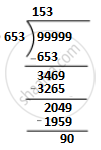Advertisements
Advertisements
प्रश्न
Divide the largest 5 digit number by 653. Check your answer by the division algorithm.
उत्तर
Largest five-digit number = 99999

Dividend = 99999, Divisor = 653, Quotient = 153 and Remainder = 90
Check: Divisor ×Quotient + Remainder
= 653 × 153 + 90
= 99909 + 90
= 99999
= Dividend
∴ Dividend = Divisor × Quotient + Remainder
APPEARS IN
संबंधित प्रश्न
State true or false:
Whole number are closed for addition.
Fill in the blanks :
7 – 18 = ______ and (7 – 18) – 5 = ______
18 – 5 = ________ and (7 – 18) – 5 = __________
Is (7 – 18) – 5 = 7 – (18 – 5) ?
=> Subtraction of whose numbers is not ______
State if the following statement is true?
`8 ÷ (15 – 13) = 8/15-8/13`
Write the successor of: 50904
Write (T) for true and (F) for false against the following statement:
500 is the predecessor of 499.
Zero is the smallest whole number.
Write (T) for true and (F) for false against the following statement:
Every natural number is a whole number.
Determine the sum given below using suitable rearrangement.
3259 + 10001 + 2641 + 9999
Replace each * by the correct digit in the following:
\[\begin{array}{r}
&\texttt{1 0 0 0 0 0 0}\\
-&\texttt{* * * * 1}\\
\hline
&\texttt{* 7 0 4 2 *}\\
\hline
\end{array}\]
Find the difference between the smallest number of 7 digits and the largest number of 4 digits.
Find the product of the largest 3-digit number and the largest 5-digit number.
Divide and check your answer by the corresponding multiplication in the following:
34419 ÷ 149
Divide, and find out the quotient and remainder. Check your answer.
16135 ÷ 875
Find the value of: 981 + 5720 ÷ 10
(888 + 777 + 555) = (111 × ?)
The product of two odd numbers is
On dividing a number by 53 we get 8 as quotient and 5 as remainder. The number is
Fill in the blanks.
...... is a whole number which is not a natural number.
The whole number that does not have a predecessor is
LCM of two or more numbers may be one of the numbers.
